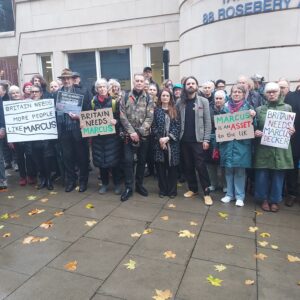For a long time now, many in Britain, particularly England, have been without a political home. The change in the Labour Party since 2019 has been profound, morphing into a totally neoliberal party and aping some of the worst policies of the Tories on migration, the environment, and human rights. Thousands have left the party in despair, while others have been driven out by a witch hunt of the Left, where charges can amount to having shared a stage with the famous film director Ken Loach, discussing cinema. Many of us outside Labour felt that there was a crying need for a new party of the Left, along the lines of many that already exist in Europe.
Earlier this year, the Breakthrough and Left Unity parties and the People’s Alliance of the Left decided to come together and try to construct such a party. We felt that there had been enough talk, both from those still inside Labour and those outside, about building an opposition from the Left to Starmerite Labour. With this view in mind, we set up two working groups, one dealing with our core principles and the other with the constitution. We also established a Steering committee, which later included the Liverpool Community Independents, a group of ex-Labour councillors in Liverpool who were re-elected in May this year under their new banner. The core principles were agreed upon, and the constitution is still being discussed. We decided to approach a number of significant activists and figures on the Left and ask them to become signatories to our call for a new party.
Armed with this and our 10 Principles, we put out the call several weeks ago and have already had nearly 5000 people sign up, almost 2000 in the first day. We are now in the process of organising online meetings in many of the regions of England and later in Wales, where activists will discuss the new party and decide on what they wish to do to build it in their own areas. Over the next few months, we will be distributing leaflets at meetings and rallies, encouraging people to sign up for the new party.
The launch of the party will be the point where we formulate policy beyond our 10 Principles and also democratically agree on a constitution. One of our guiding principles is that the party will be democratic and bottom-up from the beginning and that all of our policies won’t come from above.
We are quite clear that we are an ecosocialist party, and saving the planet will be at the centre of everything that we do, which will include working closely with climate activists and movements.
We are also committed to equality and intersectionality in all their forms and will have a strong commitment to women’s and trans rights, along with fighting against racism and for the full equality of people living with disabilities. We will also be laser-focused on workers rights and hope to work closely with the unions on this; many of our leading members are active trade unionists.
There has already been some criticism of the party, Transform, from both centrists and some on the left, saying that we should have waited until after the next general election. We feel that we need to get organised now and be in a position to intervene and offer radical voters some opportunity in the election next year, as well as build a base for the future. This is because we feel that the current Labour Party in government will offer very little that is different from the current economic and political malaise in Britain to the British people, and that this will inevitably lead to huge disillusionment and a possible opportunity for the Far Right. In order to counter this, there needs to be a real socialist opposition party in place to offer an alternative. We also want to work side by side with progressive movements and campaigns so that we are not a solely electorally focused party, which we feel parties like the Green Party have become.
Many people at this time of growing inequality, particularly young people who put their hope in the Labour Party under Jeremy Corbyn, are now crushed by the cost-of-living crisis, high rents, and the increasing realisation that they have no future under this capitalist system run by the banks, big business, and the Tory Party. They don’t see any real alternative in Labour’s business as usual offer. Transform plans to offer a real socialist alternative and to place young people, along with those marginalised by this capitalist society, at the centre of its programme and work. The party will be launched later this year, and we hope that many people will sign up between now and then and help us build an alternative future. Never has it been more urgent to build a democratic party of the left, with the planet literally burning and the cost of greed leading to increasing poverty and misery. Come and join us!
Art (54) Book Review (127) Books (114) Capitalism (68) China (81) Climate Emergency (99) Conservative Government (90) Conservative Party (45) COVID-19 (45) EcoSocialism (59) Elections (83) Europe (46) Fascism (62) Film (49) Film Review (68) France (72) Gaza (62) Imperialism (100) Israel (129) Italy (46) Keir Starmer (56) Labour Party (114) Long Read (42) Marxism (50) Marxist Theory (48) Palestine (179) pandemic (78) Protest (154) Russia (341) Solidarity (146) Statement (49) Trade Unionism (142) Ukraine (349) United States of America (134) War (370)
Latest Articles
- In Solidarity with Refugees and MigrantsMigrants and refugees are not our enemies, but are being used by the powerful to distract from the real cause of social injustice. Susan Pashkoff writes against this moral panic.
- COP30: The shift to green capitalism fails to materialiseChristian Zeller explains how despite dramatic warning signs, global politicians continued to back the fossil fuel-based economic order
- Learning from Sami cultureDave Kellaway reviews Maret Anne Sara’s exhibition on the culture of the Sami indigenous people
- Eco‑activist Marcus Decker fights deportationDave Kellaway reports from the protest held on Monday 10th November outside the immigration tribunal
- A*CR’s Your Party AmendmentsAnti*Capitalist Resistance proposes amendments to Your Party’s founding documents.







All very well, but I don’t like the name Transform…Better to use the name Left Party which also exists in Sweden, Germany, & Turkey…Just a thought…
Don’t let the name put you off.
Good luck with this. Agree with John about the choice of name, but the real question is, what makes this better than the previous (countless) heroic attempts to build a (now eco-)socialist alternative to Labour in an electoral system that crushes small parties (unlike STV)? What’s your position on Ukraine? The German ‘Left Party’ is full of stalinists who see Putin as a friend!
It’s better because the previous, as you point out, failed. Transform is just beginning. Asking about Ukraine is a divisive question and there is so much propaganda against Russia and very little against USA and UK.
I would very much agree with peter Purton’s question – what is so different from TUSC, previous Left Unity, Respect, Socialist Alliance etc? Nor do you address the thorny question that many leading unions are affiliated to the Labour Party, or how your new organisation would relate to the Labour Party beyond denouncing it. Is ACR signed up to this project?
Rather disturbing reference to England. Believe me there are many in Scotland who feel similarly. The writer seems to think we have an alternative up here.
I think it’s right that many people want to see a new party of some kind. The question is, what kind?
Joseph calls for a “a new party of the left, along the lines of many that already exist in Europe.”
That sentence really begs the question of which parties he’s referring to. The most notable examples of these “left parties” in Europe have, all things considered, been worse than useless. Die Linke has spent two decades participating as a coalition partner in capitalist governments at state level, and is on the brink of vanishing from history altogether in a dismal split.
Podemos similarly has made itself junior partner to PSOE in Spain.
Syriza first allied itself with hard-right conservatives to get into government, and then used that governmental office to sell out its supporters and impose more austerity on the Greek working class.
Perhaps there are other parties in other countries which are preferable. What is the model being referred to here? What is its politics, its attitude to the state, and its attitude to participation in governments that aim to manage capitalism rather than replace it?
Can’t accept your criticism of Podemos. The rights of many people especially women, trans and people whose main language is not Spanish thanks to Podemos being ‘junior partner to PSOE.
I think it’s important to emphasise that this is not fundamentally a moral criticism or an accusation of bad faith. It’s an assessment of the actual politics and position of these parties in relation to the class struggle.
The PSOE-Unidas Podemos coalition agreement commits both parties to this: “10.7.- Compliance with fiscal discipline mechanisms to guarantee the sustainability of public accounts. We will develop a responsible fiscal policy that guarantees budgetary stability and the reduction of the deficit and public debt […]”.
That is an overall commitment to austerity, with [perhaps] prioritisation of certain “social democratic” measures within the confines of what “fiscal discipline” will allow.
It amounts, in other words, to saying “better to break the poor than break the law”. It does not even come close to the vague aspiration towards “socialism” put forward by Transform.
Surely Transform would not join a Starmer government committing itself to “fiscal discipline”? If not, then Podemos surely cannot be the model.
There is much else that could be discussed in the track record of Podemos in government, including the huge increase of billions of euros in extra military spending. A far cry from the socialist position of “not a single penny and not a single person for this system”.
But that is surely enough to establish that Podemos is not working towards socialism, in words or in deeds? So, respectfully, the question needs to be asked again. What is the model “left party” which Transform wants to emulate?